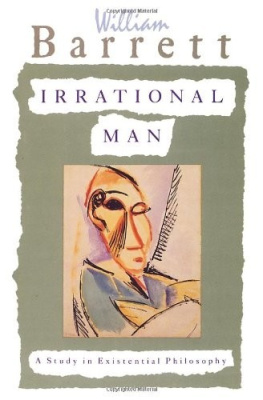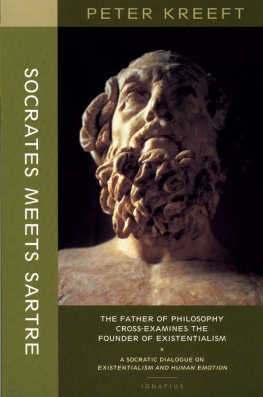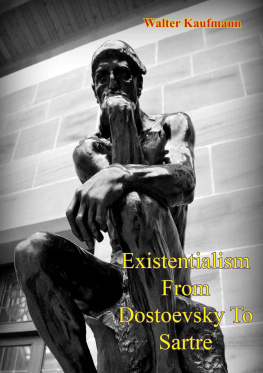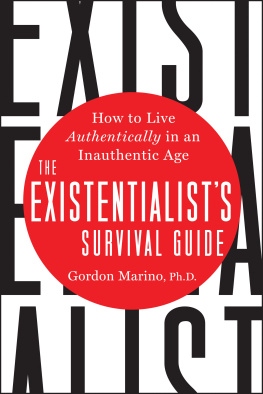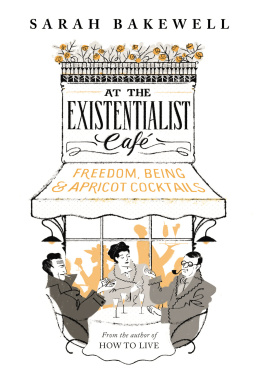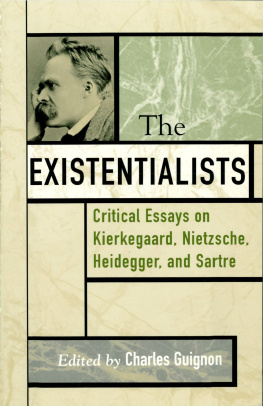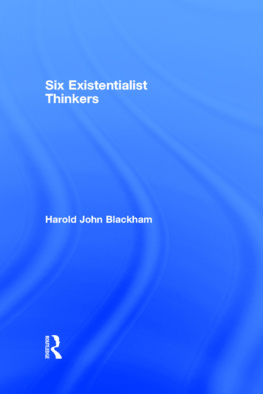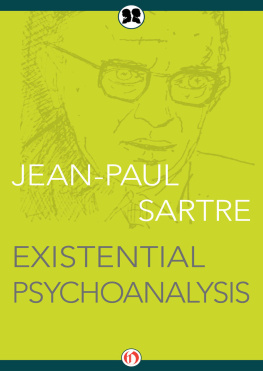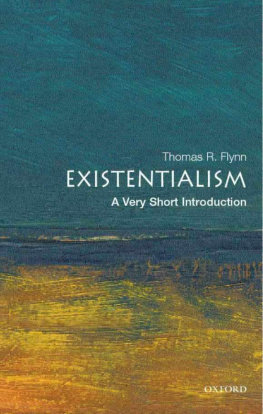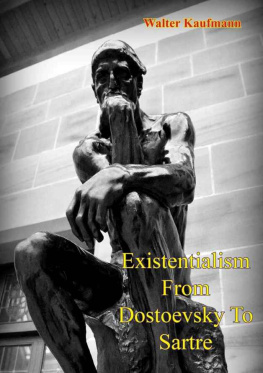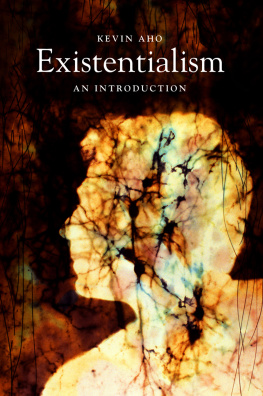William Barrett is widely known as one of the first philosophers to introduce existentialism to America. Besides a long and distinguished career as a professor of philosophy, he has been editor of Partisan Review and the literary critic for Atlantic Monthly. Barrett is the author of The Illusion of Technique and The Truants, among other books.
I wish to thank Mr. Andrew Chiappe and Miss Catherine Carver for reading the manuscript and making many valuable suggestions for its improvement.
CONTENTS
I:
1:
2:
3:
II: THE SOURCES OF EXISTENTIALISM IN THE
WESTERN TRADITION
4:
5:
6:
III:
7:
8:
9:
10:
IV:
11:
PART ONE
The Present Age
CHAPTER ONE
The Advent of Existentialism
T HE story is told (by Kierkegaard) of the absent-minded man so abstracted from his own life that he hardly knows he exists until, one fine morning, he wakes up to find himself dead. It is a story that has a special point today, since this civilization of ours has at last got its hands on weapons with which it could easily bring upon itself the fate of Kierkegaards hero: we could wake up tomorrow morning deadand without ever having touched the roots of our own existence. There is by this time widespread anxiety and even panic over the dangers of the atomic age; but the public soul-searching and stocktaking rarely, if ever, go to the heart of the matter. We do not ask ourselves what the ultimate ideas behind our civilization are that have brought us into this danger; we do not search for the human face behind the bewildering array of instruments that man has forged; in a word, we do not dare to be philosophical. Uneasy as we are over the atomic age, on the crucial question of existence itself we choose to remain as absent-minded as the man in Kierkegaards story. One reason we do so lies in the curiously remote position to which modern society has relegated philosophy, and which philosophers themselves have been content to accept.
If philosophers are really to deal with the problem of human existenceand no other professional group in society is likely to take over the job for themthey might very well begin by asking: How does philosophy itself exist at the present time? Or, more concretely: How do philosophers exist in the modern world? Nothing very high-flown, metaphysical, or even abstract is intended by this question; and our preliminary answer to it is equally concrete and prosy. Philosophers today exist in the Academy, as members of departments of philosophy in universities, as professional teachers of a more or less theoretical subject known as philosophy. This simple observation, baldly factual and almost statistical, does not seem to take us very deeply into the abstruse problem of existence; but every effort at understanding must take off from our actual situation, the point at which we stand. Know thyself! is the command Socrates issued to philosophers at the beginning (or very close to it) of all Western philosophy; and contemporary philosophers might start on the journey of self-knowledge by coming to terms with the somewhat grubby and uninspiring fact of the social status of philosophy as a profession. It is in any case a fact with some interesting ambiguities.
To profess, according to the dictionary, is to confess or declare openly, and therefore publicly; consequently, to acknowledge a calling before the world. So the word bears originally a religious connotation, as when we speak of a profession of faith. But in our present society, with its elaborate subdividing of human functions, a profession is the specialized social taskrequiring expertness and know-howthat one performs for pay: it is a living, ones livelihood. Professional people are lawyers, doctors, dentists, engineersand also professors of philosophy. The profession of the philosopher in the modern world is to be a professor of philosophy; and the realm of Being which the philosopher inhabits as a living individual is no more recondite than a corner within the university.
Not enough has been made of this academic existence of the philosopher, though some contemporary Existentialists have directed searching comment upon it. The price one pays for having a profession is a dformation professionelle, as the French put ita professional deformation. Doctors and engineers tend to see things from the viewpoint of their own specialty, and usually show a very marked blind spot to whatever falls outside this particular province. The more specialized a vision the sharper its focus; but also the more nearly total the blind spot toward all things that lie on the periphery of this focus. As a human being, functioning professionally within the Academy, the philosopher can hardly be expected to escape his own professional deformation, especially since it has become a law of modern society that man is assimilated more and more completely to his social function. And it is just here that a troublesome and profound ambiguity resides for the philosopher today. The profession of philosophy did not always have the narrow and specialized meaning it now has. In ancient Greece it had the very opposite: instead of a specialized theoretical discipline philosophy there was a concrete way of life, a total vision of man and the cosmos in the light of which the individuals whole life was to be lived. These earliest philosophers among the Greeks were seers, poets, almost shamansas well as the first thinkers. Mythological and intuitive elements permeate their thinking even where we see the first historical efforts toward conceptualization; they traffic with the old gods even while in the process of coining a new significance for them; and everywhere in the fragments of these pre-Socratic Greeks is the sign of a revelation greater than themselves which they are unveiling for the rest of mankind. Even in Plato, where the thought has already become more differentiated and specialized and where the main lines of philosophy as a theoretical discipline are being laid down, the motive of philosophy is very different from the cool pursuit of the savant engaged in research. Philosophy is for Plato a passionate way of life; and the imperishable example of Socrates, who lived and died for the philosophic life, was the guiding line of Platos career for five decades after his masters death. Philosophy is the souls search for salvation, which means for Plato deliverance from the suffering and evils of the natural world. Even today the motive for an Orientals taking up the study of philosophy is altogether different from that of a Western student: for the Oriental the only reason for bothering with philosophy is to find release or peace from the torments and perplexities of life. Philosophy can never quite divest itself of these aboriginal claims. They are part of the past, which is never lost, lurking under the veneer of even the most sophisticatedly rational of contemporary philosophies; and even those philosophers who have altogether forsworn the great vision are called upon, particularly by the layman who may not be aware of the historical fate of specialization that has fallen upon philosophy, to give answers to the great questions.
The ancient claims of philosophy are somewhat embarrassing to the contemporary philosopher, who has to justify his existence within the sober community of professional savants and scientists. The modern university is as much an expression of the specialization of the age as is the modern factory. Moreover, the philosopher knows that everything we prize about our modern knowledge, each thing in it that represents an immense stride in certainty and power over what the past called its knowledge, is the result of specialization. Modern science was made possible by the social organization of knowledge. The philosopher today is therefore pressed, and simply by reason of his objective social role in the community, into an imitation of the scientist: he too seeks to perfect the weapons of his knowledge through specialization. Hence the extraordinary preoccupation with technique among modern philosophers, with logical and linguistic analysis, syntax and semantics; and in general with the refining away of all content for the sake of formal subtlety. The movement known as Logical Positivism, in this country (the atmosphere of humanism is probably more dominant in the European universities than here in the United States), actually trafficked upon the

